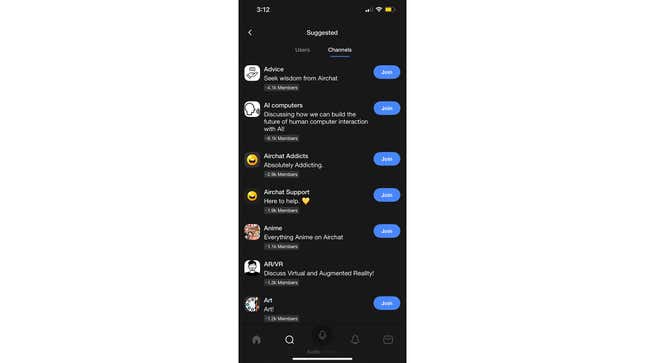If you’ve been catching up on what’s hip in the social media space, you might have heard of Airchat. It’s the new, big, exclusive, invite-only thing that’s gotten internet residents scrambling for access.
The brains behind this platform are Naval Ravikant, a renowned investor and founder of AngelList, and Brian Norgard, the former CPO of Tinder. Fun fact: Airchat was originally launched in 2023 but didn’t gain much traction. Recently, Naval and Brian rebuilt the app and launched an entirely new experience on iOS and Android around mid-April.
What is Airchat, and how does it work?
Airchat is a voice-only social media platform. The easiest way to describe it is that it’s Twitter but make it voice-only. So, every post and message on the platform is a voice note. You can have a one-on-one with someone or start a broadcast-style thread for all Airchat users to contribute to. It just has to be voice; there isn’t a text input option. All the voice messages are transcribed, so you still see text on the app. There’s a video input option, too, but I haven’t seen anyone using it yet.
What I like about Airchat
I have some reservations about this app, but I will give it credit where it’s due. I like that it’s at least trying to humanize conversations. We’ve been hiding behind our keyboards for way too long. It’s nice to come out of that shell finally.
I spotted a user requesting a pause/resume recording button so they can take a moment to gather their thoughts mid-sentence, but I actually like that there isn’t one. It helps keep the nature of the voice messages raw and unfiltered.
Users have reported that they’ve seen a change in how they communicate since they started using the app and feel that they talk more confidently and use fewer filler words. I strongly agree with the latter. I can’t think of a better way to realize how many times I use “like” in a sentence.
Secondly, but most importantly, accessibility. An app like Airchat is undeniably excellent for folks with mobility issues. Anyone with limited hand strength, arthritis, or other grasping disabilities can benefit from not having to type. I believe the voice output also makes the experience easier for individuals with vision impairment.
I can imagine the app being ridiculously helpful for folks with low attention spans. I say this because I, too, have a terrible attention span—I find it extremely difficult to sit through an entire movie and cannot watch content without subtitles to help me focus—and I found consuming content on this app extremely easy.
First, it’s because the content comes in bite-sized pieces. It’s short voice notes instead of the podcast-style communication that would happen on another recent voice-only app, Clubhouse. Also, since you can see live transcription, you also know how long a certain voice message is and how much of it has been covered, which helps retain attention. Lastly, the transcription acts like subtitles in a movie. They keep you focused and help with anything you missed in the voice message.
While I’m comparing it to Clubhouse, I want to add that it’s much easier to participate in a conversation on Airchat. Both literally and figuratively. Literally, because anyone can reply to anyone. You just gotta hit record and send. It’s an accessible and inclusive place.
At Clubhouse, you raise your hand to be given permission to speak, and only if you’re in a room where the hosts are letting the audience contribute will you be granted speaking rights. Even then, you can briefly occupy the stage before you’re demoted to a silent audience member again. This inclusive, egalitarian setting makes users comfortable speaking about what’s on their minds. There’s way less stage fright.

The democratic setting also has the added benefit of making sure the app doesn’t turn into an echo chamber for finance bros hyping each other up (sorry, Clubhouse). The organic multi-directional flow of opinions is going to be great for a genuine exchange of thoughts and opinions.
What I’m not so sure about on Airchat
These aren’t things I ‘dislike’ about Airchat; I’m just a bit confused about them. First, the app is admittedly just Twitter with voice notes, which isn’t groundbreaking enough. Sure, it has its share of pros, but I don’t think it currently offers enough innovation on its own to become the next big thing.
Also, since the transcription is excellent and extremely precise (I should’ve added this in the What I Like section), you find yourself reading more than listening, defeating the app’s whole purpose. Since the voice message is always going to be slower than the speed you can skim through the transcription, you eventually start going through your feed like you would on Twitter. I initially thought this was just me, but Alex Debecker validated my experience. He claims he spends 40% of his time on the app reading instead of listening.

The fact that you can mute sound on the app for a read-only experience facilitates us even more. The voice messages can also be sped up to 3x, but reading still feels more convenient and caters to my impatience.

Listening to voice messages isn’t always convenient, too. Most people don’t like sounds from their phones playing out loud, and you don’t always have headphones around. Another case where reading is an easier option.
Despite being a voice-only experience, you’re given options (transcription for voice notes, being able to mute sound) to not opt for that; it makes you wonder how the app is any different from a regular text-based social media app. I would appreciate the app for offering users flexibility, but I think it went too far with that and somewhat killed its entire purpose.

